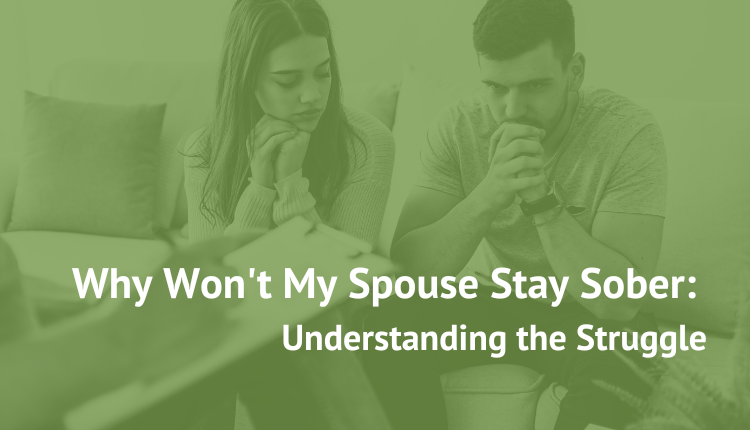If you’ve ever asked yourself, “Why won’t my spouse stay sober?” you’re likely feeling frustrated, confused, and helpless. It’s common to wonder why someone you love can’t seem to maintain sobriety, even when they know how harmful addiction is. Understanding the reasons behind relapse can help you offer better support and find peace in your own role.
The Challenge of Addiction
Addiction is a chronic disease, not a matter of willpower. It affects the brain’s reward system, which makes it difficult to stop using substances, even after treatment. Addiction rewires the brain to crave the substance, so quitting is far more complicated than simply deciding to stop. When you’re wondering why your spouse won’t stay sober, it’s important to realize that the disease of addiction can overpower the desire to quit. This is why people often return to substance use, even after trying to stop.
Unresolved Underlying Issues
Many times, addiction is a way to cope with deeper issues, such as trauma, mental health disorders, or stress. If these underlying problems aren’t addressed during treatment, relapse becomes more likely. It’s possible that your spouse is struggling with these challenges. Therapy can help uncover these root causes, which can make it easier for them to stay sober.
Lack of Support or Structure
One reason why your spouse won’t stay sober could be a lack of support. Sobriety requires a strong support network, including family, friends, and recovery groups. Without this, it’s easy for someone to feel isolated and revert to old habits. Structured recovery programs provide accountability and community, which are critical for maintaining sobriety. A lack of structure may make it harder for your spouse to avoid triggers and resist cravings.
Unmet Expectations of Treatment
Sometimes, people have unrealistic expectations about recovery. They may expect to feel better right away or believe that completing a treatment program is enough to stay sober for good. Recovery, however, is a lifelong process. If your spouse expected immediate results and didn’t get them, they might feel discouraged and turn back to substance use. It’s important to understand that setbacks are part of the process and don’t mean failure.
Difficulty Managing Stress and Triggers
Addiction often develops as a way to cope with stress, anxiety, or emotional pain. Without learning new, healthier ways to handle these feelings, your spouse may return to alcohol or drugs when life gets overwhelming. Recognizing triggers and stressors and developing healthy coping strategies are key to long-term sobriety. If they haven’t built these skills, maintaining sobriety can feel impossible.
Committing to Ongoing Recovery
Sobriety isn’t something that’s achieved once and then forgotten. It requires ongoing commitment and effort. Continuing therapy, attending support groups, and staying connected to a recovery community are all essential parts of maintaining sobriety. If your spouse isn’t fully engaged in long-term recovery, it may explain why they haven’t been able to stay sober.
Support for Family Members & Spouses
New Paradigm Recovery offers a weekly online support group specifically for families of individuals struggling with addiction. This group provides a safe space to share experiences, receive guidance, and learn coping strategies for managing the challenges of supporting a loved one in recovery. The virtual format ensures accessibility for families, no matter where they are located. In addition to this supportive group, free help is also available through programs like Al-Anon, which provides resources and peer support for families affected by addiction. Together, these resources offer essential guidance and community for those navigating a loved one’s recovery.
New Paradigm Recovery: Outpatient Addiction Treatment
At New Paradigm Recovery, we offer comprehensive outpatient addiction treatment for individuals struggling to stay sober. We understand the complexities of addiction and provide personalized care to address the underlying issues that contribute to relapse. Located in Northern Virginia and serving the Metro DC area, our programs include Intensive Outpatient Programs (IOP), individual therapy, and group support, all designed to help individuals build a strong foundation for lasting recovery. Our compassionate team is dedicated to helping your spouse find the tools they need to stay sober and thrive in their recovery. Contact us today to learn if New Paradigm’s addiction treatment center is right for you.

